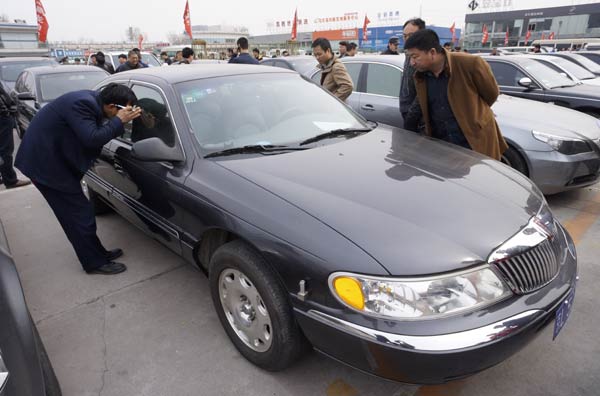Reform will replace government vehicles with cash allowances
 |
|
Prospective buyers examine government cars to be auctioned in Beijing. More official cars from regional governments will be auctioned off this year.[Photo/Xinhua] |
Another 115 cars from China's central government were auctioned off on March 21, part of its ongoing campaign to reform its fleet of official vehicles.
All the vehicles, together with another 400 sold since January, are among all 3,184 vehicles that central government departments and state-level institutions had taken out of service.
According to plans the State Council issued in July 2014, only cars for minister-level officials and for public security purposes, such as police cars, would be kept while those used for daily business would be auctioned off on the open market.
Officials will instead receive monthly transport allowances, which vary depending on the recipient's rank, from 500 yuan ($80) to a maximum of 1,300 yuan.
The reform plans are designed to cut government expenditure and prevent officials from using government cars on private occasions. They had frequently been accused of doing so.
Among the auctioned vehicles were models from premium brands including Mercedes-Benz, Lincoln and Audi, as some were used for transporting foreign guests.
Over the past 30 years, international brands have dominated government fleets. Toyota was the most popular in the early days and later was replaced by Audi.
Now things have changed and more Chinese brands are making it onto the government's procurement list.
Following the central government's move, regional governments are also expected to slash their number of their official cars soon.
Experts estimate around 800,000 of 4 million official cars nationwide will be taken out of service under this reform.
According to the State Council's plan, those local governments are to finish the reform by the end of 2015.
Ye Qing, deputy head of the Hubei statistics bureau and a long-time advocate of official car reform, told the Economic Observer that the reform will take more time at regional governments.
He estimated that some of those governments won't start the program until the deadline so their officials can use the cars as much as possible and the governments can save on the transport allowances.
Li Chunhong, director of Guangdong's development and reform commission, said the provincial government is expected to start the reform in April.
As a result of the changes, car rental companies expect to see accelerated business. "If governments lease cars from rental companies, it could prove to be one of the most practical and economic way to meet their transport demands," said Jia Xinguang, a senior auto analyst in Beijing.
"Employees can pay for the service through the allowances they get every month."
Lu Zhengyao, CEO of CAR Inc, one of the country's largest car rental firms, told 21st Century Business Herald that the reform might translate into a 100 billion yuan market, and he expects a considerable part of that to go to the car-leasing market.
